- Home
- Tim Winton
The Riders Page 21
The Riders Read online
Page 21
He hoisted her into the smoky little joint and found the toilet under the stairs.
‘In there,’ he murmured, nodding to the patrons propped against the bar.
‘Messieurs.’
The proprietor, a fat man with earrings and peroxided curls raised his eyebrows.
‘Et pour monsieur?’
Scully took a moment to get it. No such thing as a free piss. He ordered an espress and sat looking at the bleary men with their English rock-star complexions. They all had moustaches, it seemed, and had taken the night’s revelry into the morning. They looked spent.
His coffee came and Billie emerged from the stairwell.
‘I looked for Femmes.’
‘Yeah?’
‘But they were all Homos.’
‘Hommes.’
‘No, it was Homos on both doors. There was a man in one.’
Scully paused, coffee halfway to his mouth. ‘Oh?’
‘He was asleep on the floor. Too tired to pull his pants up, I spose. He had a flower sticking out his bum.’
The coffee cup clacked back into its saucer.
‘Come on.’
Scully left some francs on the table and hoiked her out into the street.
‘Let’s stick to the automatic toilets from now on, huh?’ The further he got from the little café the sillier he felt.
‘The ones you put money in? The money dunny?’
‘That’s the one.’
‘They have music so no one hears you fart. And they wash themselves, you know. But the music’s the best.’ She looked at him, smiling suddenly. ‘I reckon someone stuck it in for a joke.’
‘What’s that?’
‘The flower.’
‘Oh gawd.’
‘Still,’ she smiled shrewdly, ‘it could have grown there. If he didn’t wash.’
All the way up the Rue de Rivoli, bumping against each other like drunks, they screamed and giggled.
• • •
IT WAS COLD AND STILL in the Tuileries. The long arid promenades of white gravel crackled underfoot. Bare chestnuts and planes stood without shadows. From the Louvre entrance they walked nervously, eyes narrowed with alertness. Now and then, in their path, lay a horse chestnut left over from the time of sunlight and leaves. Only a few people were about. Children in hoods and mittens chased by au pairs. Old men playing boules. Up at the Concorde end the fountain stood in the air straight as a flagpole.
Scully scanned the terraces toward the Orangeries museum. Twenty minutes to spare. His jaw ached with the tension. Billie scuffed in the gravel beside him, hat low on her brow. He dug out five francs for the swings and watched her tip and soar for a while. Bit by bit his sense of triumph was ebbing. What would he say? How could he control himself? He mustn’t frighten her off with the intensity of his feeling. He felt like a ticking bomb. No outburst of questions, no hint of recrimination. No bawling and breastbeating. Just try to be dignified for once in your life.
Scully gave Billie sixteen francs for the carousel. The coins rattled damply in his hands. Billie climbed up onto a white horse with a flaring tail. He sat beside two teenage girls who chattered and admired one another’s cowboy boots. The lights and bright paint of the carousel made a livid whirl in the dull midday. Scully shifted from buttock to buttock in the cold, swivelling now and then to scrutinize the trees behind him. He felt watched. Or paranoid. Or something. The girls beside him grew uneasy and moved off.
Five to twelve. He stood and prowled about the carousel, handed the operator more money, and waved sickly to Billie. Her horse’s teeth were bared, as if striving to bite the tail of the horse in front. They were all the same, each horse bearing down upon the next. The gay antique music set his nerves on edge.
Shit – would she show up? Okay, he’d brought Billie, despite the strict instruction of the telegram, but what alternative did he have? How could she hold it against him? He was without a clue. He had searched himself, as the Salvos said, he had examined his heart and come back to complete incomprehension. After all his guesses, all his agonies, he couldn’t know why she hadn’t shown at Shannon and now he didn’t know why she was turning up here. Faith. He was running on the scrag end of faith. In ten days Jennifer had become a ghost to him, an idea, a mystery. But her telegram crackled against his chest. A sign. It was all he had to go on.
She’d get off at the Concorde Metro and come in by the Jeu de Paume entrance, outlined by the blank expanse of the fountain pool. Their old route from St Paul when they’d come to buy Billie books at W.H. Smith across the road. Yes, that’s the way she’d come. No ghost. His wife. He knew her too well.
Tonight he’d take them out somewhere flash and traditional. Brass, leather, lace curtains. Waiters with their thumb up their arse. Snails, tails and quails – the full Gallic gallop. A good Bordeaux. A stroll on the quais. A return to civilization.
‘I don’t feel good,’ said Billie climbing down.
Noon. The ground felt spongy beneath him.
‘Sit down for a minute. You’re dizzy.’
Billie sat in the spinning shining world. Her skin was bursting and the blood inside her boiled. A chime went off inside her head. She saw sculptures up behind the fountain. They danced in the woozy glow. The seat shook like the floor of a jet. The marbled veins in that white, white face. Billie reaching out, scared to touch, scared not to. Her fingers outstretched to feel the white skin before it sets and goes hard. The smile tight as cement. The skin cold. Right before her, Billie sees it, as the cloud of silence comes down in the air of the plane. Bit by bit, her mother is turning into a statue. Something stopped. Something the rain hits and runs off, something whose eyes pale over. With an open mouth, saying nothing.
Scully saw the hooded figure appear on the terrace and felt a rash of gooseflesh. The figure froze, then turned in a whirl of dark coat as Scully straightened. He watched it stride toward the Orangeries, walking too fast for a stroll in the park. A white flash of face, a quick look and suddenly the figure tipped into a run.
Scully grabbed Billie’s arm and broke for the terrace steps. The fountain hissed. The gravel squinched and cracked like ice underfoot. He felt Billie wheeling and stumbling beside him, her legs too short to keep balance at such speed. She cried out, wrenched away and went skidding on all fours but he didn’t stop. The terrace steps were blows in the spine, the handrail burning cold, and at the moment he made the last step, he saw the shoulders and hood ducking down the street entrance to Place de la Concorde, so he wheeled right, knowing the Metro entrance was out on the corner and he had an even chance of coming down ahead of her. The gravel slurred, gave perilously beneath him. He hit the stairs and went down five at a time, barely in control, and heeled around the corner to the Metro entrance where there were more stairs and steel doors that swung to as he hit them. He burst through into the stink of piss and electricity and the sound of the train doors closing below. Empty stairs, drifts of butts and yellow billets. Four ways she could have gone and a train pulling out. The gritty air hung on him as he stood gasping and impotent against the tile wall.
‘You’re killing us!’ he screamed. ‘Fucking killing us!’
Two kids in a French parody of surfwear came up the steps nudging each other at the sight of him. The doors opened behind him to let in a shock of fresh air that stung his eyeballs and pressed him flat to the wall like the shadow he was.
• • •
UP IN THE COLD CHOKING fog Billie screamed and saw it all about her. Whirling all around were statues and birds and her own frightened voice, and pee ran down her legs hot as molten lead, burning her up, just burning her up.
Thirty-seven
SCULLY CARRIED THE CHILD tightly wrapped in his denim jacket down the Rue de Rivoli. In the steadily rising wind, the Christmas crowd avoided contact, made way, registering the desperate look of them in a second. Billie did not talk. Her face was swollen with weeping and something worse. The wind battered the canopies of oyster stalls and the upturned collar
s of holly sellers. Wreaths and wrapping paper skidded out into fogged gloss of a thousand gridlocked cars. Outside the glass doors of the BHV department store Scully submitted to the body search with a kind of hopeless rage. The guards smelled the piss on Billie’s jeans and recoiled. Scully hurled the wet jacket into the street and greeted the warm rush of air as the doors opened before him.
• • •
BILLIE TRIED TO PULL THE new jeans up over her knees but the floor was sagging everywhere and her skin was cooking. She looked in the mirror and saw a crybaby, a sook, a beggar with scraped knees and no knickers, glowing like a bushfire.
With an armful of elastic-backed jeans, as Christmas muzak rained on him and women bustled by with chirping kids, Scully stood outside the changing booth and tried to complete a thought – any thought. Knickers, jacket, credit card. Words, things petered out in his mind.
‘Scully?’
Billie’s voice was quavery.
‘You alright?’
He slid the curtain aside a little and saw the kid pressed against the fogging mirror, pants around her shins.
‘Can’t you get them up?’
She turned slowly as a tightrope walker and he saw the glassy sheen of her eyes. ‘I’m . . . I’m hot.’
Scully fell to his knees and touched her bare skin. She had a fever. God, she was burning. Her wounds pouted nastily beneath their moist plaster strips.
‘Okay,’ he murmured. ‘Let me help you. We’ll get undies on the way out.’
He had the little jeans almost up when he felt the shadow of someone behind the curtain and heard the sharp intake of breath. He swivelled and saw a woman with a hand to her mouth. A livid flush came to her cheeks as he pulled the jeans up and snapped the press-stud without looking down. He tried to shrug casually and smile in a comradely parental way, but the woman turned on her heel. Scully set his teeth and finished up grimly. He gathered Billie in his arms and headed for the register.
Thirty-eight
INTO THE WINDTUNNEL OF THE Rue de Rivoli they come, bent as a single tree, clothes and shopping demented with flapping. She slips back into the bleak doorway to let them pass blindly by without feeling the heat of her love. She knows where they are going. She knows everything there is to know about them the way the dead see the living. The wind pricks her nipples and knees, the tip of her nose, and she watches her life limp by in the weird light of afternoon while she decides how far to follow, wondering when enough is enough, asking herself why it hurts to need so badly.
Thirty-nine
A TELEPHONE, THAT WAS THE first thing. Somewhere out of this wind, a phone. Dominique would be in town. She’d have a GP. She could translate for him. God, Scully how could you let this happen?
The streets were icing up now, the cobbles slick with it. Clochards hauled themselves out of doorways and headed for the shelter of the Metro. Billie’s mittened hand fluttered against his cheek. Car horns bleated in the narrow alleys of the Marais. He knew a place, a good place.
He swung into the fuzzy doorway of Le Petit Gavroche where the goldfish still swam in its glass orb atop the beer tap. The barman greeted him noncommitally, trying to place him. Faces came and went here. Scully slipped past the bashed zinc counter into the blue bank of cigarette smoke and found a table by the payphone. He sat Billie down, unwrapped her a little, and stowed the shopping bags beneath her.
The place was full of the usual crowd, mostly site workers on their lunchbreak. Scotsmen, Paddies, Luxembourgers. The cash work crew, hard men without papers, dodgy truck drivers, some local students, a few old hookers with big smiles and eyelashes like dead crows. It was Scully’s place. He’d heard a lot of stories here. The food wasn’t much but the beer was cheap and there was always someone lonely or drunk enough to talk to you.
Scully ordered hot chocolates and sat down to remember Dominique’s number. He cancelled Billie’s chocolate and made it lemonade. The kid sat there dreamily, trying to pull her mittens off. No, he was a blank. He dragged the butchered phone book out of its slot and looked it up. Yes. What was wrong with him? A simple thing to remember. God, his mind was going.
He stood up, stuck some francs into the phone and dialled. It rang and rang without an answer. The drinks came. Billie drank greedily. He got up and dialled again but no one picked up. Bugger it – that meant he had to ring Marianne. There just wasn’t anyone else. He dialled.
‘Allo, oui?’ The familiar deep voice. She had the timbre of a forties movie star. He paused a second, hesitating.
‘Marianne, it’s Scully.’
‘Scully?’ The mellifluous tone wavered. ‘My Gahd, Scully, where are you?’
‘Just around the corner, as it happens.’
‘Comment? Scully, what did you say?’
‘The Marais. I’m in the Marais.’
There was a considerable lag at the other end, as if Marianne were reaching over to turn something off – coffee pot, word processor, stereo. Scully saw Billie picking at the crust around the lid of the mustard pot.
‘What . . . what a surprise,’ breathed Marianne.
‘Listen, I’m sorry to call out of the blue but I was wondering if I could drop by for a second.’
‘N-no, it’s not possible,’ she murmured. ‘You understand, I have my work –’
‘Yes, of course, but listen –’
The line went dead. He rang back. Engaged. He flopped back into his seat. Shit – what was all that about? He was not exactly Marianne’s cup of tea, he knew, but they’d always been civil. She was flustered, really put out. And hostile.
He gulped at his coffee.
‘You don’t look good,’ said Billie.
‘Speak for yourself-Jesus.’
‘Don’t say that!’
A coat flapping down the stairs. A hooded coat. A blur, but not a ghost, someone real. I showed up and someone saw me. Jennifer, or someone else. Someone acting for her, maybe. To make sure I would come, to see that I was in town. Dominique? No, she was too decent. She would have talked to us. And she never struck me as that tall, that light on the loafers. But Marianne. Marianne doesn’t fancy me. She wouldn’t have qualms about giving me some stick. In fact, she’d probably enjoy it. Was everyone in on this? Why send a message and not show? Were they playing with him?
Billie licked sweat from her upper lip.
All those people you read about. The bloke who goes out for a packet of fags never to be seen again. Families whose kids go missing. People who live in limbo for years, always expecting the phone to ring, a door to open, a face to appear in a television crowd. Every mail bringing an absurd hope. And all the time really waiting, begging for the coup de grâce, the last swing of the axe to put them out of their misery. Horribly grateful to have the mangled, molested bodies of their loved ones finally uncovered in some vacant lot so that they can give up the poisonous hoping and be free.
Was that how it would be? A life of waiting by the phone? No. He didn’t care what it took. He’d find out for himself. He wouldn’t sit back and go quietly. Bollocks to that. In his soul he’d stepped beyond some mark he didn’t understand. Here, quietly, in a crappy café with a lukewarm chocolate in front of him. No, he was too tired, too scared and pissed off to go quietly.
Forty
SCULLY LEANT INTO THE IRON wind on the Rue Mahler and felt it ride up under his eyelids and whistle in his molars. He skated with Billie across the cobbles and shouldered his way past the sumptuous grey door into the frozen calm of Marianne’s courtyard.
Lights burned up on the third floor. Scully’s heart beat painfully. He felt the metal of the wind in him.
‘Take no prisoners,’ he muttered.
Billie quaked and said nothing.
In the entry hall which smelled of mail and polish he jabbed the intercom button hard enough to feel bone through the numbness. His twenty-five-franc mittens were stiff and damp.
‘Oui, allo?’
‘Me again.’
Nothing. Just static. A blizzard from tha
t little speaker box. He looked at his boots, felt the chill of the wind still in his spine, saw Billie’s feverish eyes and livid cheeks.
‘It’s cold down here, Marianne. And I’ve brought Billie.’
It was a long ugly few seconds before the access door clicked open. He took Billie’s mittened hand and they went up silently in the elevator. It was familiar, that little red box. He remembered coming down in it with Jennifer a couple of times, both of them four sheets to the wind and giggling like kids.
Up on her floor Marianne had the door open. Her thick auburn hair was free and she wore little lace-up shoes and a black woollen suit. She fixed him with a firm smile.
‘Scully, you look –’
‘Terrible, I know.’
She presented her cheeks to him in the ritual manner and touched Billie’s head gravely and then the three of them stood awkwardly in the hallway.
‘We’re house-trained, Marianne. It’s safe enough to let us in.’
She hesitated a moment and turned on her heel. Scully followed across the lustrous timber floor into the kingdom of steam heat and hired help. Marianne’s two fat Persians loped away to hide. The apartment smelled of polish and of the oil of the puce abstracts that hung huge on the white walls. Scully couldn’t help but run his hand across the painted surface of the plaster as he went. His first job in Paris, this place. It was perfect. He worked like a pig on it and took a pittance, setting the tone for the rest of his time here. Still, they were friends, Jennifer’s new friends, and he was eager to please.
But sometimes he wondered if the cheapness of his bill hadn’t caused its own problems. Marianne had been more friendly to him first up – effusive, even. But after the paint job she cooled off. For a few weeks he tried to think of anything he could have done wrong. The job was excellent, but had he spilt primer on something, scratched the floor somehow, pissed on the toilet seat? There was nothing – not even a Rainbow Warrior joke. It was the size of his bill. She wasn’t insulted – Scully always let her know that he knew she and Jean-Louis were loaded – but it was as though she felt he expected something in return. A fresh guardedness lay across the top of her Parisian diffidence. She saw him as a loser, he thought. Not just a tradesman but a cut-rate one at that. Europe – it was hair raising.

 An Open Swimmer
An Open Swimmer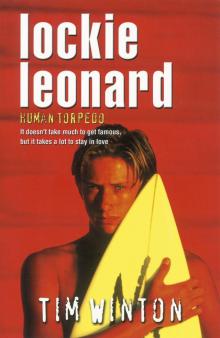 Human Torpedo
Human Torpedo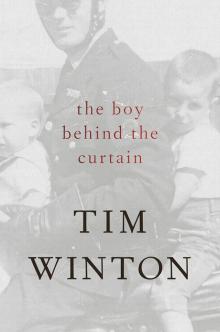 The Boy Behind the Curtain
The Boy Behind the Curtain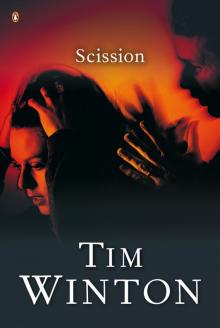 Scission
Scission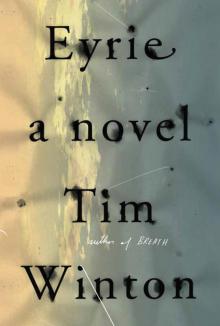 Eyrie
Eyrie Island Home
Island Home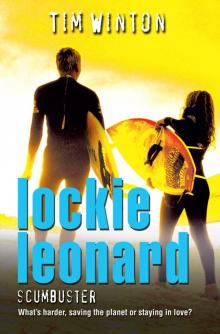 Scumbuster
Scumbuster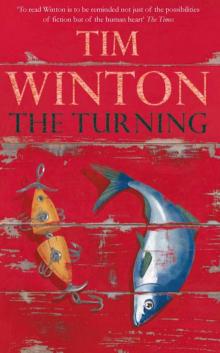 The Turning
The Turning Legend
Legend Blueback
Blueback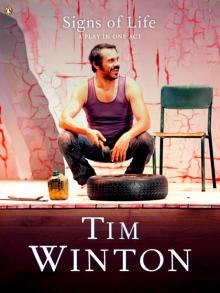 Signs of Life
Signs of Life Breath
Breath Land's Edge
Land's Edge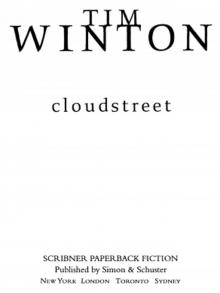 Cloudstreet
Cloudstreet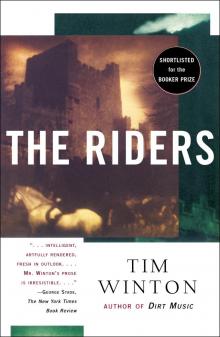 The Riders
The Riders Minimum of Two
Minimum of Two Shallows
Shallows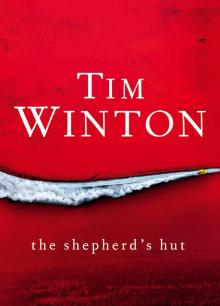 The Shepherd's Hut
The Shepherd's Hut In the Winter Dark
In the Winter Dark